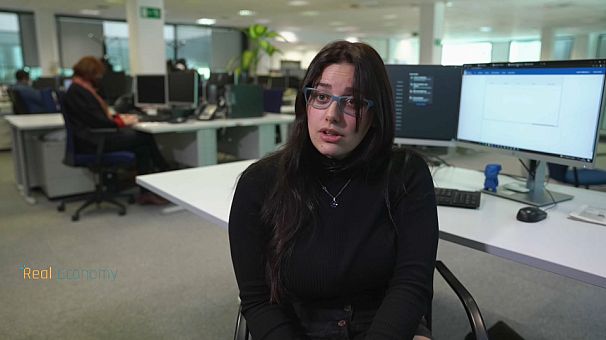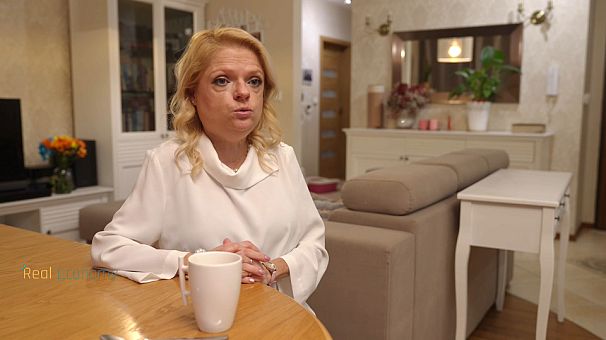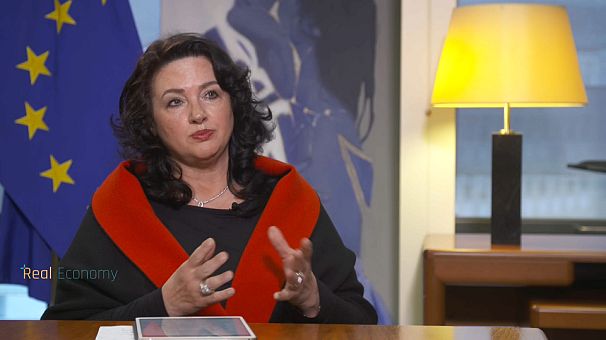Real Economy travels to Poland and Spain to meet two women with disabilities breaking down barriers in the work place and asks European Commissioner Helena Dalli what action is being taken at a European level.
In this episode, Real Economy travels to Poland and Spain to meet the women breaking down barriers in the workplace for those with disabilities and asks European Commissioner for Equality, Helena Dalli what action is being taken.
 ADVERTISEMENT
ADVERTISEMENT
 ADVERTISEMENT
ADVERTISEMENT
This report is also available:
- In sign language
- In audio description
Around 87 million people in Europe have some kind of disability and many of us are likely to face one in our lifetime, be it from an accident, illness or simply growing older.
Having a job is one of the best ways to ensure independence and social inclusion, yet only 50.8% of people with disabilities are in work compared to 75% of people who don't have a disability.
Spain: boosting job opportunities
In Spain, the number of people with disabilities entering the job market has risen by more than 20 percent in the last six years, in part because of public funding and programmes.
Twenty-three year old Alicia has a hearing impairment. She recently got a job as an App tester after completing a training programme with ‘Digital Talent”.
“When my colleagues are speaking I can’t concentrate, so they've given me a quiet place to work. It means I now have less headaches. They are also looking to buy me noise reducing headphones,’’ Alicia says.
Alicia's state-run company Tragsa Group has adopted a social integration plan designed to be attentive to everyone's needs.
Ana Belén Blanco del Campo, a project manager at Tragsa Group explains what the firm prioritises.
"I think the key is good communication between the work manager and the employee with regard to the work they are doing, and what they may need. The company must reflect what society really is."
The "Digital Talent" programme aims to provide trainees with the latest skills in new technologies. David Alonso, is in charge of the foundation's professional integration programme.
"We’re taking advantage of a huge niche in the job market,,,training people who will be just as productive as a person who does not have a disability,'' he says.
The 'Digital Talent' programme is partially funded by the European Social Fund. In 2021 it helped to train more than 5000 young people. In the future, there are plans to open new courses in advanced technologies.
As for Alicia, she says she now feels fully part of the labour market. That's a top priority for the European Pillar of Social Rights which seeks to help more people like her find work.
In Poland we meet a woman blazing a trail for equality in the workplace. Monika Jankowska-Rangelov is an expert in diversity and the integration of people with disabilities in the work place, having lived with her own disabilities all her life.
"I have got a motoring disability, I was sick when I was two. My general disease is Dermatomyositis, which are causing limitations in my moving around, but also it has brought me internal diseases," she tells us.
Monika says going university was key to entering the jobs market. But when it comes to higher education, many people with disabilities don't get that chance.
In Europe only about 30 percent of people with a disability get a degree compared to 40 percent who don’t have one.
"I was lucky enough that my parents were always explaining to me that I can't be working physically, I need to work with my mind. I was planning to graduate from pedagogical university but it was inaccessible for me in terms of city transport," she says.
A language graduate, Monika says she was eventually able to find her dream job after a lot of hardwork. But even if many companies are open to employing a person who has a disability, another obstacle facing many trying to find work is the fear they might lose their disability benefits.
"I think that lifting limits would be very beneficial, because I have lots of expenses, for example, for my medicines on a monthly basis. And even if I'm working it's always challenging to cover all the expenses.
Monika believes improving financial support, disability access and social integration in the work place will be vital to breaking down barriers in the future.
"I think education is the key and awareness among all employees to be inclusive and thinking of other people, like they would be thinking about themselves. There are more and more people with disabilities around us, and like me they deserve really great opportunities at work, to be active, and to live their lives to the fullest."
Europe's disability strategy
Last year the European Commission adopted a Disability Rights Strategy , which sets out initiatives supporting the right to live independently and to participate equally in all areas of life.
To find out more about what’s being done at a European level, Real Economy spoke to the EU's Commissioner for Equality Helena Dalli.
Euronews: "Why are we still in a situation in Europe where people with disabilities face so many obstacles to get into the workplace?"
Helena Dalli, European Commissioner for Equality: "Where to begin? It's a problem which we really need to address. People with a disability, they encounter so many problems when it comes to entering the labour market, even beginning earlier, their education, for instance, and access to education. So really, we have to look at this reality from the perspective of the rest of society, what it is doing in order to enable its citizens to enter the labour market? Employers should provide reasonable accommodation for people with disabilities."
Euronews: "What is the European Commission doing to tackle these barriers?"
Helena Dalli, European Commissioner for Equality: "Well we have the disability strategy. And in this strategy, we deal with what we are talking here about. So there's the disability employment package where we speak about the need for this reasonable accommodation and how to encourage and help people with disabilities to enter the labour market. And we have the disability platform where different organisations meet and exchange good practices. I make it a point that I meet persons with disabilities because they are the experts about their reality. And we share what we learn with social partners, and there is this conversation going on."













